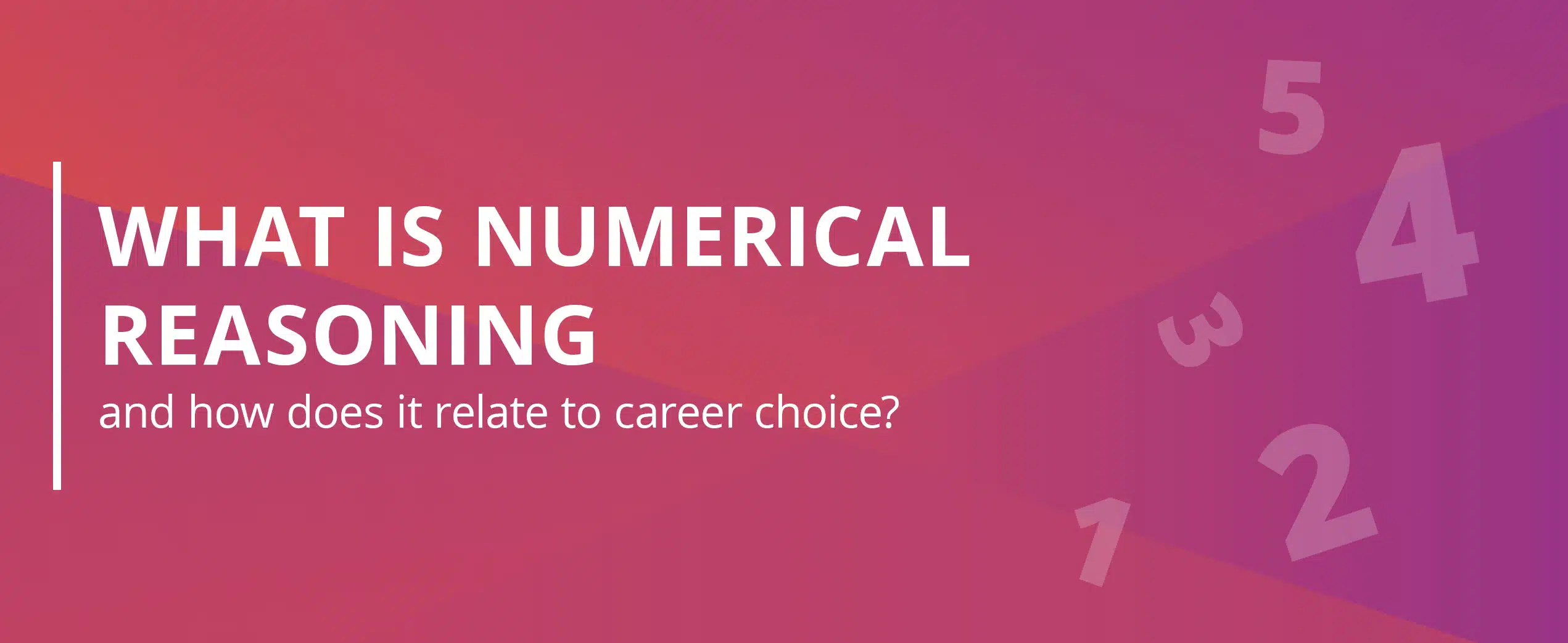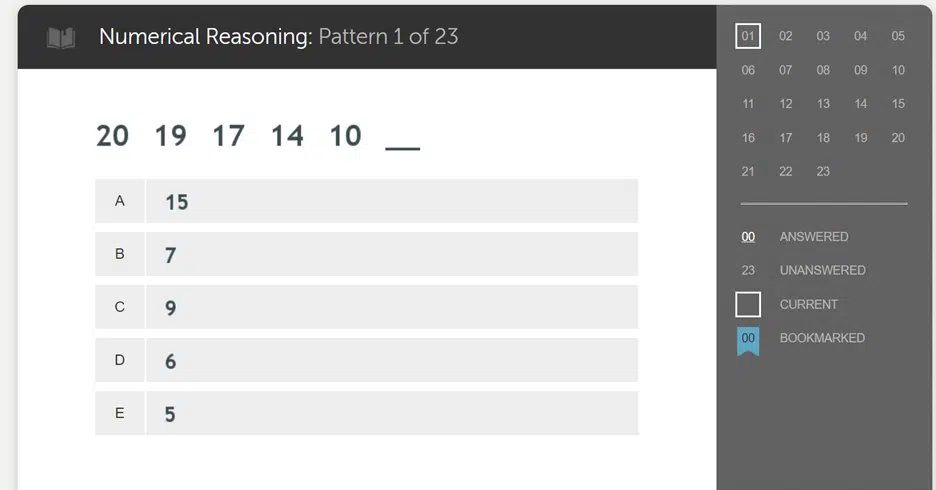Numerical reasoning is an aptitude, which is someone’s ability to learn or perform in given areas. Everyone has an aptitude for numerical reasoning. But for some people, the aptitude is stronger than for others.
In this post, we define what an aptitude for numerical reasoning looks like. And we cover how it’s measured, and how it relates to career choice.
Numerical reasoning as an aptitude
Numerical reasoning involves processing numerical patterns logically and easily. People with strong numerical reasoning excel at more than addition, multiplication, and division. They easily process, analyze and interpret numerical charts, trends, and relationships.
When someone’s aptitude for numerical reasoning isn’t one of their strongest aptitudes, they take longer to understand patterns in numerical information, especially if it’s their first interaction with that information. And they may feel lost when looking at a report with a lot of unrelated data sets. But they may excel when applying a numerical formula they’re familiar with already.
Someone with a strong aptitude for numerical reasoning finds trends in numbers interesting. They enjoy number games and puzzles. They can memorize and recall numerical facts from various sources and put them to practical use. They can make accurate estimates and projections from data. And they’re good in roles that require instant access to numerical facts and information.
People with a strong aptitude for numerical reasoning are needed for the ever-expanding tech and data-driven careers waiting to be filled.
Careers that require a stronger aptitude for numerical reasoning
A CNBC article titled, “10 Skills You Need to Land a Top Job in 2022, According to Glassdoor,” showed that time series analysis, statistical modeling, and machine learning are some of the top skills needed in tech jobs today. And all those skills require a good aptitude for numerical reasoning.
The article quotes, Daniel Zhao, a senior economist and data scientist at Glassdoor. He says, “We’re also seeing an increased presence of tech specialties in job requirements and an influx of data-related jobs, which shows how important it is for businesses to hire workers who can make sense of big data.”
Numerical reasoning matters in non-tech roles too, including for roles in finance and marketing.
Here are a few of the growing careers to consider if you have a stronger numerical reasoning aptitude.
Actuary
Actuaries use mathematics, statistics, and financial theory to analyze the economic costs of risk and uncertainty to forecast risk and liability for payment of future benefits.
- Median annual salary: $105,900
- Projected growth rate 2020–2030: 24%
Computer scientist
Computer scientists design innovative uses for new and existing computing technologies.
- Median annual salary: $131,490
- Projected growth rate 2020–2030: 22%
Economist
Economists collect and analyze data, research trends, and evaluate economic issues for resources, goods and services, or monetary and fiscal policy.
- Median annual salary: $105,630
- Projected growth rate 2020–2030: 13%
Machinist
Machinists set up and run equipment that creates precision parts, instruments, and tools.
- Median annual salary: $47,730
- Projected growth rate 2020–2030: 7%
Management analyst
Management analysts find ways to improve organizational efficiency and effectiveness by conducting studies and evaluations and designing systems and procedures.
- Median annual salary: $93,000
- Projected growth rate 2020–2030: 14%
Market research analyst
Market research analysts — or marketing analysts or strategists — cover an array of jobs from analysts who study how market conditions impact sales to those who dig into marketing data to find trends and marketing opportunities.
- Median annual salary: $63,920
- Projected growth rate 2020–2030: 22%
Operations research analysts
Operations research analysts use advanced mathematical and analytical methods to help solve complex issues, help management make decisions, formulate policies, and improve functions.
- Median annual salary: $82,360
- Projected growth rate 2020–2030: 25%
Statistician
Statisticians analyze data and apply computational techniques to solve problems. They may specialize in biostatistics, agricultural statistics, business statistics, economic statistics, or survey statistics.
- Median annual salary: $96,280
- Projected growth rate 2020–2030: 33%
People who don’t have a strong aptitude for numerical reasoning may be stressed and unsatisfied in these jobs. But how do you know what your aptitude for numerical reasoning is?
An aptitude assessment for numerical reasoning
You can find out what your aptitudes are for careers with an aptitude assessment. An aptitude assessment, like YouScience Discovery, is a psychometric test that assesses your natural ability to perform or learn certain tasks within a given subject or topic.
Discovery assesses aptitudes for numerical reasoning, verbal reasoning, spatial reasoning, visual comparison speed, sequential reasoning, and idea generation.
Note that aptitude assessments aren’t standardized tests, which measure knowledge you already have. Questions on standardized tests are based on right or wrong and every test is scored on the same criteria. On an aptitude assessment, there is no one correct answer to any question. Common standardized tests include the ACT, SAT, and AP exams taken after AP classes.
The Classroom states that “Aptitude is more of a projection or forecast of a student’s potential or future ability. Achievement is more of a determination of how much a student has learned or mastered.”
What types of questions does an aptitude assessment for numerical reasoning use?
Numerical reasoning assessments cover a range of concepts. Questions aren’t based on math computation, but rather on the ability to problem solve and analyze numerical information and patterns. Questions focus on ratios, estimation, number sequencing, data interpretation, and analyzing charts and graphs.
A numerical reasoning question from YouScience Discovery where the user is asked to determine which number comes next in the sequence.
A sample numerical reasoning test question from Numerical Reasoning: Examples Questions on SHL.com.
How to prepare for an aptitude assessment
The goal in taking an aptitude test is to discover natural ability. In the case of Discovery, you’re discovering that ability to find out the types of jobs you’ll naturally perform well in and find satisfying instead of frustrating. Because of that, test preparation and practice tests aren’t a good idea.
And you don’t want to cheat. If you do, you risk ending up in the wrong job — one that is stressful and unfulfilling.
Discover your aptitudes and best-fit careers
To find out what your aptitude for numerical reasoning is, take Discovery yourself.
To find out whether your aptitude for spatial visualization makes you the next Tony Stark, or another job that will make you just as successful, try YouScience Aptitude & Career Discovery for yourself.
Talk to us how YouScience Brightpath is revolutionizing how individuals, education, and industries connect and succeed.



